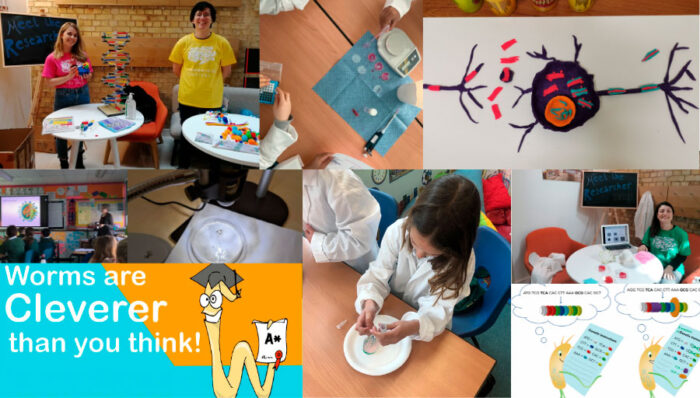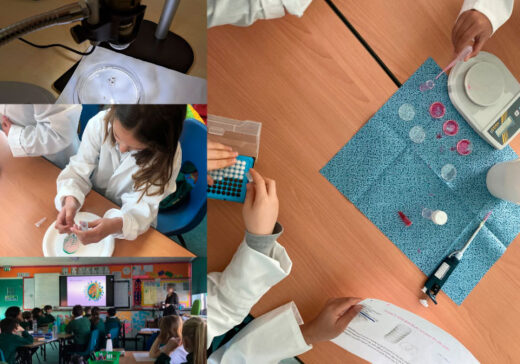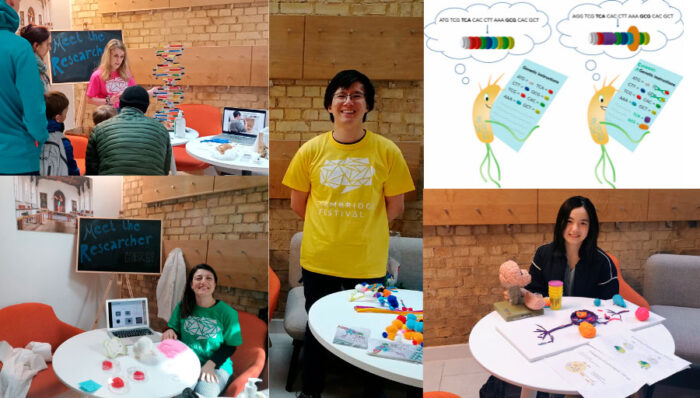LMB scientists are engaging at in-person public events again after a long hiatus throughout the pandemic

In-person public engagement took a hit during the pandemic. This meant either ceasing plans entirely or rapidly modifying activities to work for an online audience. With so much academic learning happening during the pandemic on screens though, there was the additional challenge of people’s ‘digital fatigue’ for public engagement to face.
In-person engagement is now slowly emerging from its hibernation and events are on the rise.
British Science Week 2022 (11th – 20th March)
Earlier in March during British Science Week, some of our scientists brought both existing and brand-new activities into primary schools. Exciting work from Madeline Lancaster’s group on brain development and organoid models was shared with children using a brain matching activity and evolutionary tree. In addition, Madeline also gave the children a live dissection of colourful jelly brains, resembling how staining is used in science to identify certain proteins.
With help from Andrew Beale in the O’Neill group, children were shown frogspawn at various magnifications using a DinoLite microscope – the same model used in the LMB’s Microscopes4Schools Competition (previously the Science Image Award). The children asked all kinds of questions on body clocks and about other microscopic organisms.
Anna Albecka-Moreau from the James’ group helped children understand viral infections using the Virus Wars: Antibodies Strike Back learning resource. In addition, Meng Wang and LMB alumnus Sarah Caddy, taught younger children about viruses and antibodies.
Anna had the following reflections on the new challenges faced by scientists as they take part in public engagement in schools again.
“It was a bit worrying to go into the school and interact with nearly a hundred children. But teachers do it every day. The children had a great time asking lots of questions and having fun with the pipetting activities”

Cambridge Festival 2022 (31st March – 10th April)
The Cambridge Festival was fully digital last year. The LMB adapted engagement activities for this transition by giving a virtual live tour of the building and creating a digital version of the primary school activity, Worms Are Cleverer Than You Think!
The Worms were back at this year’s festival, remaining online and also shared with primary schools as an Easter holiday activity. Our scientists also participated in a festival-wide ‘Meet the Researcher’ event at the University of Cambridge.
“I really liked the back in person format. I could see that kids’ and parents’ excitement was building when I was talking about organoids but really exploded when they handled the organoids and looked at them through the microscope. This triggered more curiosity and questions. They could have a feeling of how small mini-brains are – way smaller than their expectations of a “mini” brain.” – Ilaria Chiaradia
According to festival organisers, overall numbers of visitors were lower when compared to pre-pandemic years – largely due to ongoing concern about increased cases of COVID-19. However, attendees who did come gave positive feedback on the stalls and events. Thanks to Rose Westhorpe, Clinton Lau, Heidy Chen and Ilaria Chiaradia for taking part!
In addition to this in-person event at the festival, Kim Liu, a researcher in the Protein and Nucleic Acid Chemistry Division at the LMB, gave a talk on synthetic biology at the Intellectual Forum, run by Jesus College. He discussed how scientists could ethically ‘break the rules’ of the genetic code to include more building blocks for life and what positive impact this could have on science and human health. At the last hour, this event was moved online after being planned initially as a hybrid talk at Jesus College. Yet despite the change, as observed by Kim, this opened up the invitation to a broader audience than before who asked some intriguing questions both on the biology and his career towards the field from his background in chemistry.

Why does in-person public engagement matter?
Public engagement is a valuable tool which can provide the space to break down existing barriers to science. Engaging in new ways outside a laboratory – and an academic setting – can help scientists to discuss the importance of their work with local communities and non-scientific audiences. This two-way dialogue is essential when building the LMB’s trustworthiness as a scientific institute, as well as nurturing the understanding our audiences have of the ground-breaking research we do. Sharing these findings with open discussion and creative activities, rather than solely informing the chosen audience, holds potential to show the true relevance of the work we do at the LMB to both people’s individual lives and within their communities.
Finding the right way to tell scientific stories to broad audiences within the public domain is a rewarding challenge. It is also one which requires constant dynamic and adaptive thinking, similar to that within scientific research. Successful engagement work allows target audiences to see themselves in the scientific world with the help of a more relatable lens. Often, it’s at events like these that a spark in interest begins, and may even create a future scientist.
Thanks to LMB Visual Aids and the Mechanical Workshop for helping create these activities with us.
Further references
MRC LMB Public Engagement
National Coordinating Centre for Public Engagement (NCCPE) – what is public engagement?
British Science Week
Cambridge Festival